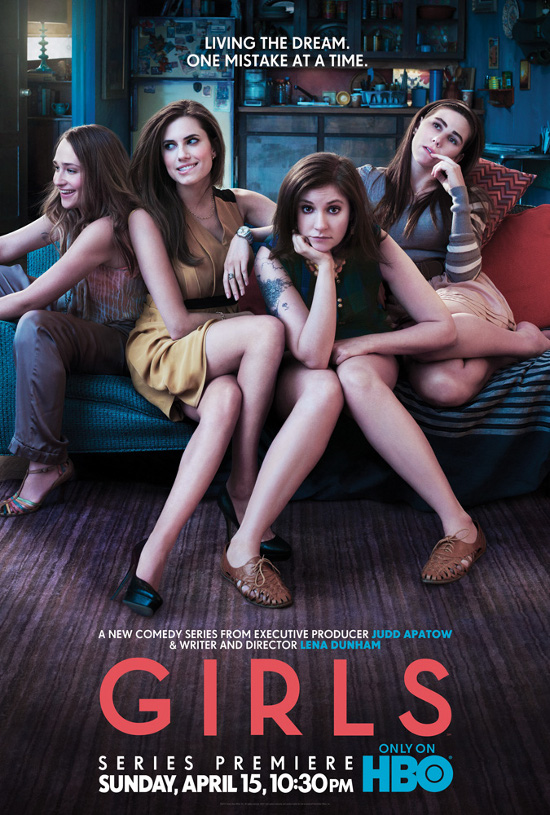
HBO’s latest comedy, by film Tiny Furniture’s writer/director, Lena Dunham, and Bridesmaids’ producer, Judd Apatow, follows the lives of four twentysomething New Yorkers. It’s the latest in a long line of female-driven programming hitting the small screen, which means it already bears the pressure of an increasingly demanding demographic, as well as the sneers from He-Man Woman-Haters like Two and a Half Men‘s creator, Lee Aronsohn (and I quote: “…there’s an overflow of vagina on TV these days.”).
Who wins out in the end? After seeing just the pilot, it’s hard to tell. However, there does seem to be a lot of hope for it.
But before we delve into the specifics of the show, let’s look at some key points:
First off, there is no overflow of vagina on television. Sorry, Lee Aronsdouche, but just because most shows don’t carry their Man Essence in their titles like yours, doesn’t mean a clear majority of TV shows only feature either male protagonists or female protagonists who don’t do much besides whet Man Palates.
In other words, men don’t have to constantly shout their gender identity from the rooftops to be recognized because guy-driven entertainment’s seen as The Norm, whereas female-driven shows suddenly have the power and reach to do so. We’ve been cast off as the ditzy, sex pots for decades, and we finally have the confidence to stand up and say, “I am woman, watch me be awesome.”
Really, the best way to measure Progress is by looking at Representation; that is, by taking note of how many, what kind, and how effective the portrayals of certain characters are.
Sex and the City, for example, is often a hot button topic among the feminist camp. While it epically failed the Bechdel Test, among others, it did introduce the world to the mysterious world of Lady Sexuality. Which seems to be part of the primary basis for Dunham’s latest endeavour.
And in its pilot, Dunham’s brainchild does just that. Throughout the episode you see scenes of girls doing what TV was previously so afraid of showing girls do: sharing bathroom time like guys, and talking about sex in an honest way. But even when it makes a clear reference to its alleged predecessor, Sex and the City, it only does so in the service of declaring itself Different. There’s never the feeling that it’s only there for shock value, or to make a statement. It’s subtler in its representation of sexuality, and, in fact, makes the point of saying — whispering, really — that there’s more to this Movement than what goes on between the girls’ legs.
Financial burdens are also a centrepiece, as the main characters are meant to be the quintessential visage of this 21st century generation that’s facing one of the greatest economic struggles in history. How [straight] girls relate to one another, too, plays a vital role in the overall story, as, even though one of the characters is having boyfriend troubles, the girls talk about more than how the male sex has righted or wronged them.
The writing is, to say the least, cleverer than anything you’ll find in any of the other incarnations of Bridesmaids you’ll find on TV these days, as it doesn’t seem determined to make you believe it’s Progressive: it just is. The characters are likeable only occasionally, and for the most part that’s only because they seem like people you might actually meet in your daily life, or are, yourself.
It’s brave in that it must be an autobiographical arc of its creator. The opening scene, in fact, expertly establishes Dunham’s character, Hannah, as a whiny, insecure, spoiled brat, but you just can’t tear your eyes away, or help but laugh. Her story is your story, and, chances are, we all know how it feels to have to deal with the after-years of being told “you’re special” by your parents in an economy that says otherwise.
But with all that said, there is one critique we should bear in mind before we throw every Emmy Dunham’s way:
For a show with such a general title, Girls, you’d expect there to be a more diverse cast of characters, and not just a small collection of middle class to upper middle class White chicks with what appear to be [Straight] White Girl Problems.
It isn’t all that surprising that the show made zero effort to be all that diverse [yet, I hope], as the first step in just about every movement, especially the Feminist movement, is planting your feet in the more familiar before taking steps into new territory. But even so, representation is the best indicator of progress, so, if anything, I sincerely hope women of color, as well as queer women, find their ways into Hannah’s life.
So congrats, Lena Dunham, on what looks to be an interesting and hilarious show, but please — PLEASE — remember the rest of us.

I too, am always hopeful when I see a show about Manhattanites that it will in fact, reflect the diversity which makes NY so incredible. great review. very insightful. humorous. and hopeful:)